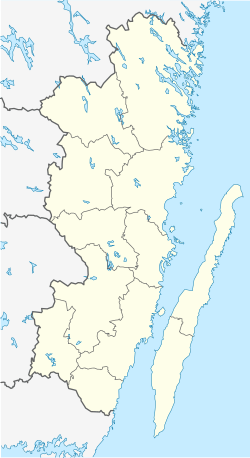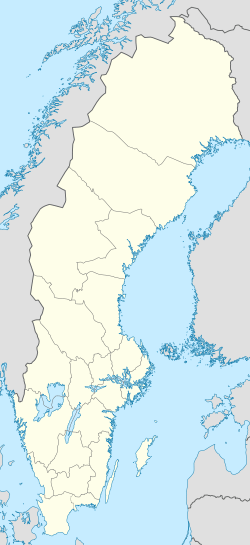Kristdala facts for kids
Quick facts for kids
Kristdala
|
|
|---|---|
| Country | Sweden |
| Province | Småland |
| County | Kalmar County |
| Municipality | Oskarshamn Municipality |
| Area | |
| • Total | 1.40 km2 (0.54 sq mi) |
| Population
(31 December 2010)
|
|
| • Total | 945 |
| • Density | 673/km2 (1,740/sq mi) |
| Time zone | UTC+1 (CET) |
| • Summer (DST) | UTC+2 (CEST) |
Kristdala is a small town in Sweden. It is located in Oskarshamn Municipality in Kalmar County. In 2010, about 945 people lived there. It's a place with a long history and a popular market.
Contents
Kristdala's Ancient Past
Kristdala has a very old and interesting history. Millions of years ago, a space rock hit this area.
The Meteorite Impact
About 470 to 443 million years ago, a huge meteor crashed near where Kristdala is today. This impact created a special shape in the ground. Today, this spot is Lake Hummeln. It is known as the Hummeln structure.
Early Human Settlements
People have lived in the Kristdala area for a very long time. The oldest signs of humans are from the Bronze Age. This was about 1700 to 500 years Before Common Era (B.C.E.). You can still see an old stone pile, called a cairn, from this time. It is in Krithems Park. The park also has round stones. These stones are a type of tomb from the Iron Age.
How Kristdala Got Its Name
Experts who study place names believe "Kristdala" has a special meaning. They think it comes from "Christ Valley" or "Christ Valleys." This name probably started when Christianity came to the area. This was around the 12th century.
Kristdala Church History
The first church in Kristdala was made of wood. It was mentioned in writings as early as 1358.
From Wood to Stone
The old wooden church was taken down in 1792. A new church was built in the same year. This new church was made of stone. It is still an important building in the community today.
The Lively Kristdala Market
Near where the first church stood, a market grew during the Middle Ages. This market became very important.
A Meeting Point for Roads
The market was in a great location. It was where five important roads met. These roads came from the coast and from inland areas. People from places like Figeholm, Döderhult, Oskarshamn, Hultsfred, and Vimmerby would come to trade.
What Was Traded
Long ago, trading animals like cattle was a big part of the market. Farmers would bring their animals to sell and buy.
Kristdala Market Today
Today, the Kristdala market is still held twice a year.
- The summer market is in July. It is very popular with visitors. About 20,000 people come each year.
- The fall market is around Michaelmas, which is September 29.
Now, instead of cattle, people shop for many different things. You can find candy, clothes, and other items at the market. It's a fun event for everyone!



